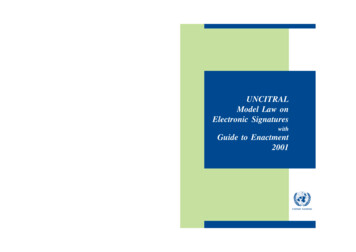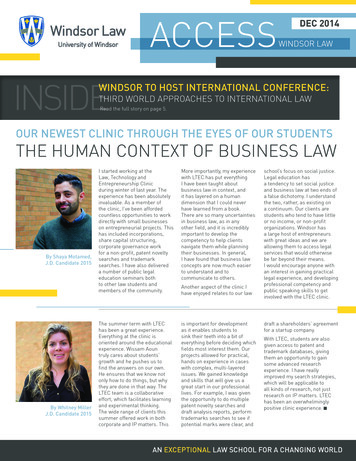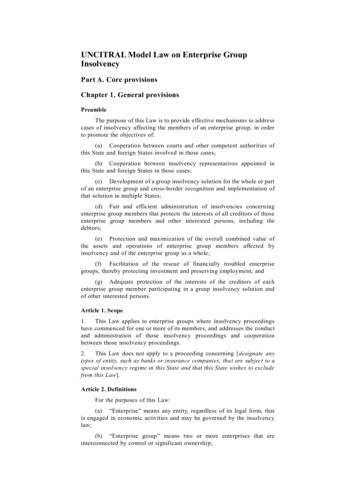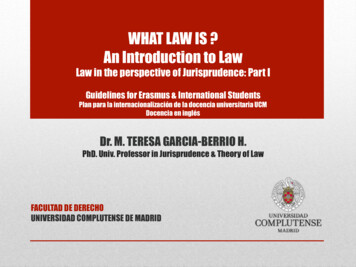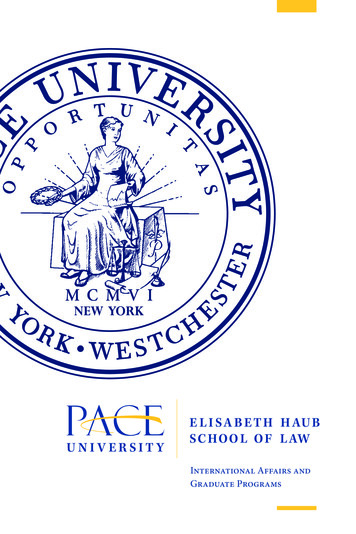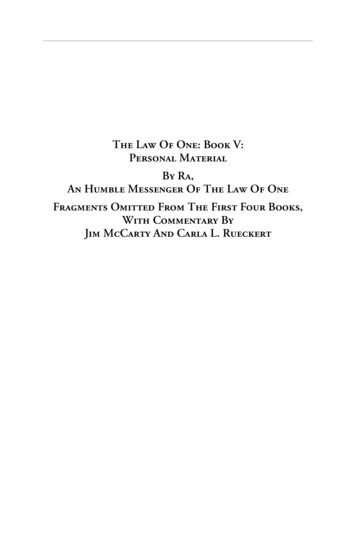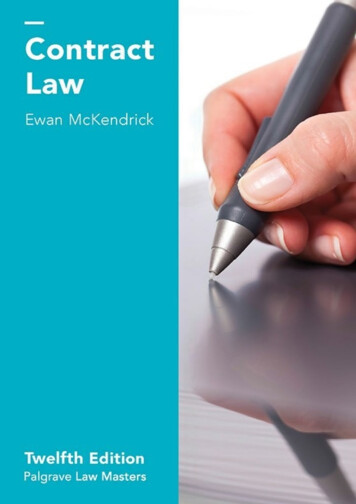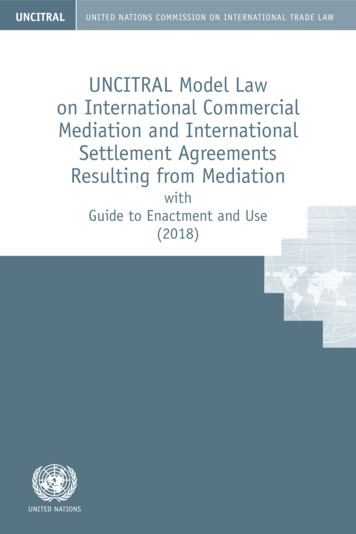
Transcription
UNCITRALUNITED NATIONS COMMISSION ON INTERNATIONAL TRADE LAWUNCITRAL Model Lawon International CommercialMediation and InternationalSettlement AgreementsResulting from MediationwithGuide to Enactment and Use(2018)UNITED NATIONS
Further information may be obtained from:UNCITRAL secretariat, Vienna International CentreP.O. Box 500, 1400 Vienna, AustriaTelephone: ( 43-1) 26060-4060Telefax: ( 43-1) 26060-5813Internet: uncitral.un.org E-mail: uncitral@un.org
UNITED NATIONS COMMISSION ON INTERNATIONAL TRADE LAWUNCITRAL Model Lawon International CommercialMediation and InternationalSettlement AgreementsResulting from MediationwithGuide to Enactment and Use(2018)UNITED NATIONSVienna, 2022
NoteSymbols of United Nations documents are composed of capital letters combinedwith figures. Mention of such a symbol indicates a reference to a United Nationsdocument.UNITED NATIONS PUBLICATIONSales No.: E.22.V.25ISBN 978-92-1-130455-8e-ISBN 978-92-1-001882-1 United Nations, May 2022. All rights reserved, worldwide.The designations employed and the presentation of material in this publication donot imply the expression of any opinion whatsoever on the part of the Secretariatof the United Nations concerning the legal status of any country, territory, city orarea, or of its authorities, or concerning the delimitation of its frontiers orboundaries.This publication has not been formally edited.Publishing production: English, Publishing and Library Section, United NationsOffice at Vienna.ii
ContentsResolution adopted by the General Assembly . . . . . . . . . . . . . . . . . . . . . . . . . . . . . . viiPart One NCITRAL Model Law on International Commercial MediationUand International Settlement Agreements Resulting from Mediation(2018) . . . . . . . . . . . . . . . . . . . . . . . . . . . . . . . . . . . . . . . . . . . . . . . . . . . . . . 1Section 1.General provisions . . . . . . . . . . . . . . . . . . . . . . . . . . . . . . . . . . . . . . . . . . .1Article 1.Scope of application of the Law and definitions . . . . . . . . . . . .1Article 2.Interpretation . . . . . . . . . . . . . . . . . . . . . . . . . . . . . . . . . . . . . . . . . .2International commercial mediation . . . . . . . . . . . . . . . . . . . . . . . . . . .2Section 2.Article 3.Scope of application of the sections and definitions . . . . . . . .2Article 4.Variation by agreement . . . . . . . . . . . . . . . . . . . . . . . . . . . . . . . . . .3Article 5.Commencement of mediation proceedings . . . . . . . . . . . . . . .3Article 6.Number and appointment of mediators . . . . . . . . . . . . . . . . . . .4Article 7.Conduct of mediation . . . . . . . . . . . . . . . . . . . . . . . . . . . . . . . . . . .4Article 8.Communication between mediator and parties . . . . . . . . . . . .5Article 9.Disclosure of information . . . . . . . . . . . . . . . . . . . . . . . . . . . . . . .5Article 10. Confidentiality . . . . . . . . . . . . . . . . . . . . . . . . . . . . . . . . . . . . . . . . .5Article 11. Admissibility of evidence in other proceedings . . . . . . . . . . . .5Article 12. Termination of mediation proceedings . . . . . . . . . . . . . . . . . . .6Article 13. Mediator acting as arbitrator . . . . . . . . . . . . . . . . . . . . . . . . . . . . .7Article 14. Resort to arbitral or judicial proceedings . . . . . . . . . . . . . . . . . .7Article 15. Binding and enforceable nature of settlement agreements . .7Section 3.International settlement agreements . . . . . . . . . . . . . . . . . . . . . . . . . . .7Article 16. Scope of application of the section and definitions . . . . . . . . .7Article 17. General principles . . . . . . . . . . . . . . . . . . . . . . . . . . . . . . . . . . . . . .9Article 18. Requirements for reliance on settlement agreements . . . . . . .9Article 19. Grounds for refusing to grant relief . . . . . . . . . . . . . . . . . . . . . . . 10iii
Part Two. Guide to Enactment and Use of the UNCITRAL Model Lawon International Commercial Mediation and InternationalSettlement Agreements Resulting from Mediation (2018). . . . . . . 13ParagraphPageI. Introduction to the Model Law on International CommercialMediation and International Settlement Agreements Resultingfrom Mediation . . . . . . . . . . . . . . . . . . . . . . . . . . . . . . . . . . . . . . . . . . . . . . . 7-2716A.Notion of mediation and purpose of the Model Law . . . . . . 7-1416B.The Model Law as a tool for harmonizing legislation . . . . . . 15-1918C.Scope and structure of the Model Law . . . . . . . . . . . . . . . . . . . . 20-2520D.Assistance from the UNCITRAL secretariat . . . . . . . . . . . . . . 26-2721II. Article-by-article remarks . . . . . . . . . . . . . . . . . . . . . . . . . . . . . . . . . . . . . 28-167Section 1.General provisions . . . . . . . . . . . . . . . . . . . . . . . . . . . . . . . 282222Article 1.Scope of application of the Law and definitions . . 29-3522Article 2.Interpretation . . . . . . . . . . . . . . . . . . . . . . . . . . . . . . . . . . 36-3725Section 2.International commercial mediation . . . . . . . . . . . . . . 3827Article 3.Scope of application of the section anddefinitions . . . . . . . . . . . . . . . . . . . . . . . . . . . . . . . . . . . . . 39-4827Article 4.Variation by agreement . . . . . . . . . . . . . . . . . . . . . . . . . 4933Article 5.Commencement of mediation proceedings . . . . . . 50-5634Article 6.Number and appointment of mediators . . . . . . . . . 57-6037Article 7.Conduct of mediation . . . . . . . . . . . . . . . . . . . . . . . . . . 61-6439Article 8.Communication between mediator and parties . . 6541Article 9.Disclosure of information . . . . . . . . . . . . . . . . . . . . . . . 66-6842Article 10. Confidentiality . . . . . . . . . . . . . . . . . . . . . . . . . . . . . . . . . 69-7144Article 11. Admissibility of evidence in other proceedings . . . 72-8346Article 12. Termination of mediation proceedings . . . . . . . . . . 84-8651Article 13. Mediator acting as arbitrator . . . . . . . . . . . . . . . . . . . . 87-9153Article 14. Resort to arbitral or judicial proceedings . . . . . . . . 92-9555Article 15. Binding and enforceable nature of settlementagreements . . . . . . . . . . . . . . . . . . . . . . . . . . . . . . . . . . . . . 96-9757iv
Section 3.ParagraphPageInternational settlement agreements . . . . . . . . . . . . . . 98-10458Article 16. Scope of application of the section anddefinitions . . . . . . . . . . . . . . . . . . . . . . . . . . . . . . . . . . . . . 105-12259Article 17. General principles . . . . . . . . . . . . . . . . . . . . . . . . . . . . . . 123-12865Article 18. Requirements for reliance on settlementagreements . . . . . . . . . . . . . . . . . . . . . . . . . . . . . . . . . . . . . 129-14067Article 19. Grounds for refusing to grant relief . . . . . . . . . . . . . . 141-16571Article 20. Parallel applications or claims . . . . . . . . . . . . . . . . . . . 166-16777v
Resolution adopted bythe General Assembly[on the report of the Sixth Committee (A/73/496)]73/199. Model Law on International CommercialMediation and International Settlement AgreementsResulting from Mediation of the United NationsCommission on International Trade LawThe General Assembly,Recalling its resolution 2205 (XXI) of 17 December 1966, by which it established the United Nations Commission on International Trade Law with a mandateto further the progressive harmonization and unification of the law of internationaltrade and in that respect to bear in mind the interests of all peoples, in particularthose of developing countries, in the extensive development of international trade,Recalling also its resolution 57/18 of 19 November 2002, in which it notedthe adoption by the Commission of the Model Law on International CommercialConciliation1 and expressed the conviction that the Model Law, together with theConciliation Rules of the Commission2 recommended in its resolution 35/52 of4 December 1980, contributes significantly to the establishment of a harmonizedlegal framework for the fair and efficient settlement of disputes arising in international commercial relations,Recognizing the value of mediation as a method of amicably settling disputesarising in the context of international commercial relations,Resolution 57/18, annex.Official Records of the General Assembly, Thirty-fifth Session, Supplement No. 17 (A/35/17), para. 106; see alsoYearbook of the United Nations Commission on International Trade Law, vol. XI: 1980, part three, annex II.12vii
Believing that the amendments to the Model Law on International CommercialConciliation will significantly assist States in enhancing their legislation governingthe use of modern mediation techniques and in formulating such legislation wherenone currently exists,Noting that the decision of the Commission to concurrently prepare a convention on international settlement agreements resulting from mediation and anamendment to the Model Law on International Commercial Conciliation wasintended to accommodate the different levels of experience with mediation in different jurisdictions and to provide States with consistent standards on the crossborder enforcement of international settlement agreements resulting frommediation, without creating any expectation that interested States may adopt eitherinstrument,3Noting with satisfaction that the preparation of the amendments to the ModelLaw was the subject of due deliberation and that they benefited from consultationswith Governments as well as with intergovernmental and non-governmentalorganizations,1. Expresses its appreciation to the United Nations Commission onInternational Trade Law for finalizing and adopting the Model Law on InternationalCommercial Mediation and International Settlement Agreements Resulting fromMediation (amending the Model Law on International Commercial Conciliation);42. Requests the Secretary-General to transmit the text of the Model Law toGovernments and other interested bodies;3. Recommends that all States give favourable consideration to the ModelLaw when revising or adopting legislation relevant to mediation, bearing in mindthe desirability of uniformity of the law of mediation procedures and the specificneeds of international commercial mediation practice, and invites States that haveused the Model Law to advise the Commission accordingly.62nd plenary meeting20 December 20183Official Records of the General Assembly, Seventy-second Session, Supplement No. 17 (A/72/17), paras. 238–239;see also A/CN.9/901, para. 52.4Official Records of the General Assembly, Seventy-third Session, Supplement No. 17 (A/73/17), annex II.viii
Part OneUNCITRAL Model Law on InternationalCommercial Mediation and InternationalSettlement Agreements Resulting fromMediation (2018)Section 1.Article 1.General provisionsScope of application of the Lawand definitions1. This Law applies to international commercial1 mediation2 and to internationalsettlement agreements.2. For the purposes of this Law, “mediator” means a sole mediator or two ormore mediators, as the case may be.3. For the purposes of this Law, “mediation” means a process, whether referredto by the expression mediation, conciliation or an expression of similar import,whereby parties request a third person or persons (“the mediator”) to assist themin their attempt to reach an amicable settlement of their dispute arising out of orrelating to a contractual or other legal relationship. The mediator does not havethe authority to impose upon the parties a solution to the dispute.The term “commercial” should be given a wide interpretation so as to cover matters arising from all relationships of a commercial nature, whether contractual or not. Relationships of a commercial nature include, but arenot limited to, the following transactions: any trade transaction for the supply or exchange of goods or services;distribution agreement; commercial representation or agency; factoring; leasing; construction of works; consulting; engineering; licensing; investment; financing; banking; insurance; exploitation agreement or concession; jointventure and other forms of industrial or business cooperation; and carriage of goods or passengers by air, sea,rail or road.2In its previously adopted texts and relevant documents, UNCITRAL used the term “conciliation” with theunderstanding that the terms “conciliation” and “mediation” were interchangeable. In preparing this Model Law,the Commission decided to use the term “mediation” instead in an effort to adapt to the actual and practical useof the terms and with the expectation that this change will facilitate the promotion and heighten the visibility ofthe Model Law. This change in terminology does not have any substantive or conceptual implications.11
2 UNCITRAL Model Law on International Commercial Mediation with Guide to Enactment and UseArticle 2.Interpretation1. In the interpretation of this Law, regard is to be had to its international originand to the need to promote uniformity in its application and the observance ofgood faith.2. Questions concerning matters governed by this Law which are not expresslysettled in it are to be settled in conformity with the general principles on whichthis Law is based.Section 2.Article 3.International commercial mediationScope of application of the sectionsand definitions1.This section applies to international3 commercial mediation.2.A mediation is “international” if:(a) The parties to an agreement to mediate have, at the time of the conclusionof that agreement, their places of business in different States; or(b) The State in which the parties have their places of business is different fromeither:3.(i)The State in which a substantial part of the obligations of the commercial relationship is to be performed; or(ii)The State with which the subject matter of the dispute is most closelyconnected.For the purposes of paragraph 2:(a) If a party has more than one place of business, the place of business is thatwhich has the closest relationship to the agreement to mediate;(b) If a party does not have a place of business, reference is to be made to theparty’s habitual residence.4. This section also applies to commercial mediation when the parties agree thatthe mediation is international or agree to the applicability of this section.States wishing to enact this section to apply to domestic as well as international mediation may wish toconsider the following changes to the text:– Delete the word “international” in paragraph 1 of articles 1 and 3; and– Delete paragraphs 2, 3 and 4 of article 3, and modify references to paragraphs accordingly.3
Part one. UNCITRAL Model Law on International Commercial Mediation (2018) 35. The parties are free to agree to exclude the applicability of this section.6. Subject to the provisions of paragraph 7 of this article, this section appliesirrespective of the basis upon which the mediation is carried out, including agreement between the parties whether reached before or after a dispute has arisen, anobligation established by law, or a direction or suggestion of a court, arbitral tribunal or competent governmental entity.7. This section does not apply to:(a) Cases where a judge or an arbitrator, in the course of judicial or arbitralproceedings, attempts to facilitate a settlement; and(b) [.].Article 4.Variation by agreementExcept for the provisions of article 7, paragraph 3, the parties may agree toexclude or vary any of the provisions of this section.Article 5.Commencement of mediation proceedings41. Mediation proceedings in respect of a dispute that has arisen commence onthe day on which the parties to that dispute agree to engage in mediationproceedings.2. If a party that invited another party to mediate does not receive an acceptanceof the invitation within 30 days from the day on which the invitation was sent, orwithin such other period of time as specified in the invitation, the party may electto treat this as a rejection of the invitation to mediate.4The following text is suggested for States that might wish to adopt a provision on the suspension of the limitation period:Article X. Suspension of limitation period1. When the mediation proceedings commence, the running of the limitation period regarding the claim thatis the subject matter of the mediation is suspended.2. Where the mediation proceedings have terminated without a settlement agreement, the limitation periodresumes running from the time the mediation ended without a settlement agreement.
4 UNCITRAL Model Law on International Commercial Mediation with Guide to Enactment and UseArticle 6.Number and appointment of mediators1. There shall be one mediator, unless the parties agree that there shall be twoor more mediators.2. The parties shall endeavour to reach agreement on a mediator or mediators,unless a different procedure for their appointment has been agreed upon.3. Parties may seek the assistance of an institution or person in connection withthe appointment of mediators. In particular:(a) A party may request such an institution or person to recommend suitablepersons to act as mediator; or(b) The parties may agree that the appointment of one or more mediators bemade directly by such an institution or person.4. In recommending or appointing individuals to act as mediator, the institutionor person shall have regard to such considerations as are likely to secure theappointment of an independent and impartial mediator and, where appropriate,shall take into account the advisability of appointing a mediator of a nationalityother than the nationalities of the parties.5. When a person is approached in connection with his or her possible appointment as mediator, he or she shall disclose any circumstances likely to give rise tojustifiable doubts as to his or her impartiality or independence. A mediator, fromthe time of his or her appointment and throughout the mediation proceedings,shall without delay disclose any such circumstances to the parties unless they havealready been informed of them by him or her.Article 7.Conduct of mediation1. The parties are free to agree, by reference to a set of rules or otherwise, on themanner in which the mediation is to be conducted.2. Failing agreement on the manner in which the mediation is to be conducted,the mediator may conduct the mediation proceedings in such a manner as themediator considers appropriate, taking into account the circumstances of the case,any wishes that the parties may express and the need for a speedy settlement ofthe dispute.
Part one. UNCITRAL Model Law on International Commercial Mediation (2018) 53. In any case, in conducting the proceedings, the mediator shall seek to maintainfair treatment of the parties and, in so doing, shall take into account the circumstances of the case.4. The mediator may, at any stage of the mediation proceedings, make proposalsfor a settlement of the dispute.Article 8.Communication between mediator and partiesThe mediator may meet or communicate with the parties together or witheach of them separately.Article 9.Disclosure of informationWhen the mediator receives information concerning the dispute from a party,the mediator may disclose the substance of that information to any other party tothe mediation. However, when a party gives any information to the mediator, subject to a specific condition that it be kept confidential, that information shall notbe disclosed to any other party to the mediation.Article 10.ConfidentialityUnless otherwise agreed by the parties, all information relating to the mediation proceedings shall be kept confidential, except where disclosure is requiredunder the law or for the purposes of implementation or enforcement of a settlement agreement.Article 11.Admissibility of evidence in otherproceedings1. A party to the mediation proceedings, the mediator and any third person,including those involved in the administration of the mediation proceedings, shallnot in arbitral, judicial or similar proceedings rely on, introduce as evidence or givetestimony or evidence regarding any of the following:(a) An invitation by a party to engage in mediation proceedings or the fact thata party was willing to participate in mediation proceedings;(b) Views expressed or suggestions made by a party in the mediation in respectof a possible settlement of the dispute;
6 UNCITRAL Model Law on International Commercial Mediation with Guide to Enactment and Use(c) Statements or admissions made by a party in the course of the mediationproceedings;(d) Proposals made by the mediator;(e) The fact that a party had indicated its willingness to accept a proposal forsettlement made by the mediator;(f) A document prepared solely for purposes of the mediation proceedings.2. Paragraph 1 of this article applies irrespective of the form of the informationor evidence referred to therein.3. The disclosure of the information referred to in paragraph 1 of this article shallnot be ordered by an arbitral tribunal, court or other competent governmentalauthority and, if such information is offered as evidence in contravention of paragraph 1 of this article, that evidence shall be treated as inadmissible. Nevertheless,such information may be disclosed or admitted in evidence to the extent requiredunder the law or for the purposes of implementation or enforcement of a settlement agreement.4. The provisions of paragraphs 1, 2 and 3 of this article apply whether or notthe arbitral, judicial or similar proceedings relate to the dispute that is or was thesubject matter of the mediation proceedings.5. Subject to the limitations of paragraph 1 of this article, evidence that is other wise admissible in arbitral or judicial or similar proceedings does not become inadmissible as a consequence of having been used in a mediation.Article 12.Termination of mediation proceedingsThe mediation proceedings are terminated:(a) By the conclusion of a settlement agreement by the parties, on the date ofthe agreement;(b) By a declaration of the mediator, after consultation with the parties, to theeffect that further efforts at mediation are no longer justified, on the date of thedeclaration;(c) By a declaration of the parties addressed to the mediator to the effect thatthe mediation proceedings are terminated, on the date of the declaration; or(d) By a declaration of a party to the other party or parties and the mediator,if appointed, to the effect that the mediation proceedings are terminated, on the dateof the declaration.
Part one. UNCITRAL Model Law on International Commercial Mediation (2018) Article 13.7Mediator acting as arbitratorUnless otherwise agreed by the parties, the mediator shall not act as an arbitrator in respect of a dispute that was or is the subject of the mediation proceedingsor in respect of another dispute that has arisen from the same contract or legalrelationship or any related contract or legal relationship.Article 14.Resort to arbitral or judicial proceedingsWhere the parties have agreed to mediate and have expressly undertaken notto initiate during a specified period of time or until a specified event has occurredarbitral or judicial proceedings with respect to an existing or future dispute, suchan undertaking shall be given effect by the arbitral tribunal or the court until theterms of the undertaking have been complied with, except to the extent necessaryfor a party, in its opinion, to preserve its rights. Initiation of such proceedings isnot of itself to be regarded as a waiver of the agreement to mediate or as a termination of the mediation proceedings.Article 15.Binding and enforceable nature ofsettlement agreementsIf the parties conclude an agreement settling a dispute, that settlement agreement is binding and enforceable.Section 3.Article 16.International settlement agreements5Scope of application of the section anddefinitions1. This section applies to international agreements resulting from mediation andconcluded in writing by parties to resolve a commercial dispute (“settlementagreements”).6A State may consider enacting this section to apply to agreements settling a dispute, irrespective of whetherthey resulted from mediation. Adjustments would then have to be made to relevant articles.6A State may consider enacting this section to apply only where the parties to the settlement agreement agreedto its application.5
8 UNCITRAL Model Law on International Commercial Mediation with Guide to Enactment and Use2. This section does not apply to settlement agreements:(a) Concluded to resolve a dispute arising from transactions engaged in by oneof the parties (a consumer) for personal, family or household purposes;(b) Relating to family, inheritance or employment law.3. This section does not apply to:(a) Settlement agreements:(i)That have been approved by a court or concluded in the course ofproceedings before a court; and(ii)That are enforceable as a judgment in the State of that court;(b) Settlement agreements that have been recorded and are enforceable as anarbitral award.4. A settlement agreement is “international” if, at the time of the conclusion ofthe settlement agreement:7(a) At least two parties to the settlement agreement have their places of businessin different States; or(b) The State in which the parties to the settlement agreement have their placesof business is different from either:(i)The State in which a substantial part of the obligations under thesettlement agreement is to be performed; or(ii)The State with which the subject matter of the settlement agreementis most closely connected.5. For the purposes of paragraph 4:(a) If a party has more than one place of business, the relevant place of businessis that which has the closest relationship to the dispute resolved by the settlementagreement, having regard to the circumstances known to, or contemplated by, theparties at the time of the conclusion of the settlement agreement;(b) If a party does not have a place of business, reference is to be made to theparty’s habitual residence.7A State may consider broadening the definition of “international” settlement agreement by adding the following subparagraph to paragraph 4: “A settlement agreement is also ‘international’ if it results from internationalmediation as defined in article 3, paragraphs 2, 3 and 4.”
Part one. UNCITRAL Model Law on International Commercial Mediation (2018) 96. A settlement agreement is “in writing” if its content is recorded in any form.The requirement that a settlement agreement be in writing is met by an electroniccommunication if the information contained therein is accessible so as to be useable for subsequent reference.Article 17.General principles1. A settlement agreement shall be enforced in accordance with the rules of procedure of this State, and under the conditions laid down in this section.2. If a dispute arises concerning a matter that a party claims was already resolvedby a settlement agreement, the party may invoke the settlement agreement inaccordance with the rules of procedure of this State, and under the conditions laiddown in this section, in order to prove that the matter has already been resolved.Article 18.Requirements for reliance on settlementagreements1. A party relying on a settlement agreement under this section shall supply tothe competent authority of this State:(a) The settlement agreement signed by the parties;(b) Evidence that the settlement agreement resulted from mediation, such as:(i)The mediator’s signature on the settlement agreement;(ii)A document signed by the mediator indicating that the mediationwas carried out;(iii) An attestation by the institution that administered the mediation; or(iv) In the absence of (i), (ii) or (iii), any other evidence acceptable tothe competent authority.2. The requirement that a settlement agreement shall be signed by the parties or,where applicable, the mediator, is met in relation to an electronic communication if:(a) A method is used to identify the parties or the mediator and to indicate theparties’ or mediator’s intention in respect of the information contained in the electronic communication; and(b) The method used is either:
10 UNCITRAL Model Law on International Commercial Mediation with Guide to Enactment and Use(i)As reliable as appropriate for the purpose for which the electroniccommunication was generated or communicated, in the light of allthe circumstances, including any relevant agreement; or(ii)Proven in fact to have fulfilled the functions described in subparagraph (a) above, by itself or together with further evidence.3. If the settlement agreement is not in an official language of this State, thecompetent authority may request a translation thereof into such language.4. The competent authority may require any necessary document in order toverify that the requirements of this section have been complied with.5. When considering the request for relief, the competent authority shall actexpeditiously.Article 19.Grounds for refusing to grant relief1. The competent authority of this State may refuse to grant relief at the requestof the party against whom the relief is sought only if that party furnishes to thecompetent authority proof that:(a) A party to the settlement agreement was under some incapacity;(b) The settlement agreement sought to be relied upon:(i)Is null and void, inoperative or incapable of being performed underthe law to which the parties have validly subjected it or, failing anyindication thereon, under the law deemed applicable by the competent authority;(ii)Is not binding, or is not final, according to its terms; or(iii) Has been subsequently modified;(c)The obligations in the settlement agreement:(i)Have been performed; or(ii)Are not clear or comprehensible;(d) Granting relief would be contrary to the terms of the settlementagreement;(e) There was a serious breach by the mediator of standards applicable to themediator or the med
Further information may be obtained from: UNCITRAL secretariat, Vienna International Centre P.O. Box 500, 1400 Vienna, Austria Telephone: ( 43-1) 26060-4060 Telefax: ( 43-1) 26060-5813

